Entering into the toddler years presents a whole new set of parenting challenges, especially when your toddler doesn’t listen. Many days when I wonder if I’ll ever learn how to make kids listen. I enjoy a good challenge. So there’s that.
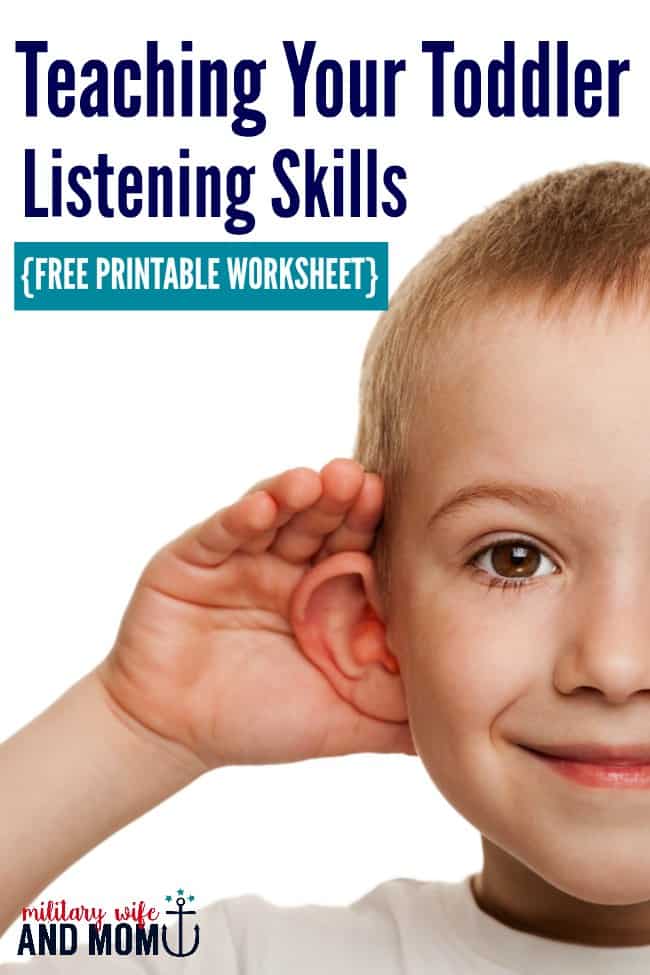
Our listening journey started the moment my son started to run around the house checking to see if off limit items were still–in fact–off limits.
He would run away in the parking lot, pull at electrical chords, throw food on the floor and when I corrected him, he would laugh and make silly faces at me.
I wasn’t laughing.
10 strategies when your toddler doesn’t listen.
Let’s check out ten strategies you can use when your toddler doesn’t listen to make your days a little less frustrating. For me, these listening strategies are worth it.
If I experience a fewer frustrating moments each day or avoid one power struggle, it can keep me from turning into an angry mom volcano, and let’s be honest, that benefits everyone.
1. Call your child by name.
Using nicknames and terms of endearment is commonplace when interacting with small kids. I call my son all sorts of crazy stuff, but when it comes to listening, I’ve found using the good old fashioned birth name is really the most effective.
Using your child’s real name helps get his attention specifically, and it let’s them know you are about to share important information.
2. Get down to the child’s level.
This is something I learned working full-time as a nurse. We were taught to get down to the patient’s eye level to help them know we cared. If a patient was lying in bed, I would squat down or sit in the chair to look the patient in the eye as we talked.
This technique applies perfectly to any age or ability. When your toddler doesn’t listen, squat down or sit on the ground before communicating. Plus, when you are at the same level, you can hear and see each other better, both of which improve listening.
3. Make eye contact.
This is an overwhelmingly popular parenting tip because it is very effective when toddlers don’t listen. In a variety of situations, eye contact is huge! After getting down to your child’s level, say his or her name again and wait until your eyes meet. At that very moment you’ll know he or she is paying attention and focusing on what you are saying.
4. Use gestures and expressions.
Toddlers understand a reasonable amount of language, but using gestures and facial expressions can better clarify your message and improve understanding. Your child will better understand what you are saying, if you furrow your brow or shake your head than if you list instructions. Similarly, you can also try to use happy expressions and nodding if you want to reinforce something your toddler is doing well.
5. Keep realistic expectations.
Recognize age appropriate expectations for your child. Most toddlers will obey only some of the time. It isn’t realistic to expect toddlers to listen to every instruction.
Related: How Much Should Your Toddler Listen?
6. Keep instructions short.
The shorter and more succinct your message, the more likely your toddler with understand you and listen. Toddlers are easily overwhelmed with long instructions and stop listening. Using one or two very short sentences, aim to keep it simple.
We also love using these printable routine cards at bedtime, mealtime and in the morning and they help A TON with cooperation!
7. Use praise effectively.
Using the right type of praise is so important when toddlers don’t listen. Using the words “good job” or “you’ve won” offers momentary praise, but it doesn’t share what the child did well, and in the long run creates narcissistic and entitled kids.
Instead, describe specifically what your child did well in each situation without using “good job.” An example would be, “You found a way to put all the toys away quickly.” Or “You carried your sink to the plate. That was helpful.” Or “You played gently with your sister.”
Recognizing your child’s individual strengths will help him or her to start doing more of what you like and less of what you don’t.
Related: The Problem With Over-Praise and What To Do Instead
8. Use validation to gain cooperation.
When kids feel heard and understood, they are far more likely to want to cooperate with you! This is often referred to as sportscasting with your child. Repeat back what the child is saying or doing. Even if you don’t agree with what the child wants, repeat the child’s upset back to them. “You want….[insert what the child wants].” This doesn’t mean you will give in to what the child wants. It simply means you understand the child’s communication, and in doing so, you’re building a bridge to cooperation.
9. Try the whisper technique.
When all else fails, I start whispering and get very quiet. When I am at my son’s level, and I am looking him in the eye, and I know he is ready to listen, I start to whisper. It’s almost as if I am telling him a secret. He starts to listen very carefully and often starts smiling. I also love using this technique when he is screaming around the house or I feel compelled to yell at him. It’s fun to do the opposite and whisper.
You could also try this crazy and weird noise tip that I learned from Language of Listening.
10. Sing your words.
Music is a powerful tool to use when your toddler doesn’t listen. It can improve a child’s mood, catch their attention, and improve listening. In addition to whispering, you could also try singing to make the words more fun and enjoyable. Children often feel like following a set of instructions that are sung to them is an exciting game or activity.
We love these following direction and listening games in our home to help our kids “practice” during play.
When your toddler doesn’t listen.
Listening is a struggle no matter the age of your child. These 10 strategies are the building blocks to help grow and nurture your child’s listening skills.
Will all of these tips make your toddler listen ALL the time?
Probably not.
However, they will help when your toddler doesn’t listen at least SOME of the time. My son is now a preschooler and his listening is getting better each day. From staying close to me in the parking lot, to making smart meal-time choices, to going to bed on time, I promise you, these techniques work if stay consistent.
Print this free toddler listening checklist.
This post comes with a free printable checklist to help with toddler listening. I always have the hardest time remembering these phrases. This printable simplifies it!
Here is a sneak preview…
Download Your Free Printable
- Download the checklist. You’ll get the printable, plus join 37,000+ parents who receive my weekly parenting tips and ideas!
- Print. Any paper will do the trick, but card stock
would be ideal.
- Place it on your refrigerator. Check things off as you go and don’t forget a thing!
Want more on toddlers?
- What No One Tells You About Parenting Toddler Boys
- 9 Phrases That Change Life with a Toddler
- Dear Moms of Wild Toddlers
- The Real Reason Why Kids Won’t Listen, Focus or Sit Still
- 7 Core Following Directions Activities That’ll Improve Listening
I've created a free email series just for you! If you are struggling with teaching your child to listen, this series will help transform your parenting. Yes, really. I've seen my proven strategies work time and time again for parents. I know it can work for you too.
After taking my free email series, you will:
- Learn simple, yet highly effective listening strategies
- Experience a stronger connection with your child
- Enjoy more peaceful parenting days
- Gain more cooperation from your child

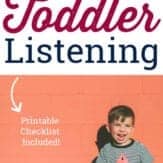
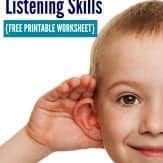
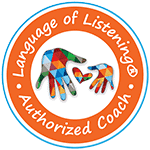
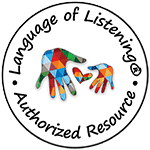
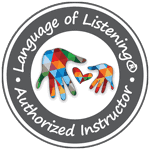
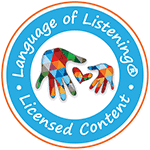








I really need this advice right now – I have toddler twins who are constantly testing boundaries and I’m not dealing with it too well. I’m going to print this out and put each of these strategies to the test. Thank you!
#laughlearnlinkup
Clare, you are too kind. Thank you for your encouragin words. I hope that they help. My son only listens some of the time, but he is a young toddler and I think that is reasonable at this point. We are a work in progress. Have a great day!
Lauren
I wish I had worked with my toddlers on table manners earlier!
It so hard to do. I really struggle with sticking with it, but I know it will be worth it in the end! Most days are far from perfect, but we are a work in progress around here 🙂
Have a great day,
Lauren
When my oldest was little… Getting dressed could be a hassle. We played a game! Who could get dressed fastest! Mommy or son?
Awesome tip Tracey! Thank you! 🙂
Hi All! This is a fantastic article. I am currently in the same situation with my first (17-month old daughter). As a first time parent all I do is read up on different ways to improve toddler listening. She has recently started to hit or pinch when she disagrees with what my husband or I say. We’ve tried the “No Zoe, please be nice” passing our hand to show her the nice approach but she continues to test us. Do you have any other advice on this?
Funny enough an obedient toddler will only listen 50-60% of the time. Developmentally that is considered a really good amount. So if she is listening at least half of the time that is a really good thing and totally normal. The other thing is just being really consistent with obedience. I wrote a post on it here: and here . Just keep trying. It’s definitely a process over the long haul. Totally relate to everything you said. My son is the exact same age 🙂
Good list! I’ve learned, that you should mirror your child’s feelings. For example, they are sad they can’t read another book before bedtime, you say “I know it makes you sad not to be able to read another book, but tomorrow we can read it (or explain whatever the reason is)” It helps the kids understand their feelings and they know you care and understand.
Great tip! Thanks for sharing 🙂
Any ideas for a thirteen month old who bites? He is usually such a sweetie but when something doesn’t go his way he turns to bite whatever he can get.
I so relate to the biting issue! My son has a biting issue on and off since he was 6 months old and he is now 19 months old. I have tried everything. Really I have. The only two things that were the most effective: walk away. Once he bit me, I would just say “biting hurts” and then walk to another part of the room and didn’t engage for a few minutes. Then I recently told him to “bite yourself” and put his arm or and near his mouth to bite. It’s still an ongoing process for us. When he gets really frustrated, he bites. Which always makes me nervous when he is playing with other kids. Other obvious things are simply treating the cause of the frustration…I know that’s not always easy. And continuing to be very consistent over time. It’s a work in progress in our home!
Thanks for your comments. I think the one where walking away and saying that it hurts could be useful. I’m definitely going to try it. He is such a sweet baby, but he definitely acts out in frustration.
Completely relate and agree with you!
Wait, is your son’s name Jameson too?!!!
From my experience, finding the best moment to talk to toddler is important. My son is a very concentrated kid and when he was at montessori school he could sit for an hour for one single task. Sooner i realize whenever he seemed to not listening, hes actually engaged in something else and is actually learning something. So i would wait till hes done, or even better, when he comes to find me to preach what i plan to preach. It worked every single time!